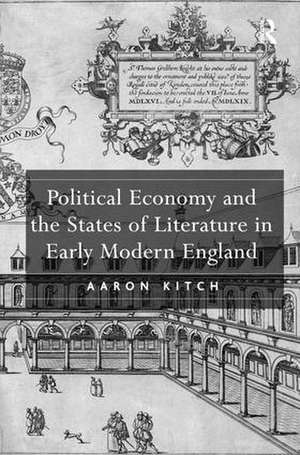Political Economy and the States of Literature in Early Modern England
Autor Aaron Kitchen Limba Engleză Hardback – 28 iul 2009
| Toate formatele și edițiile | Preț | Express |
|---|---|---|
| Paperback (1) | 465.91 lei 6-8 săpt. | |
| Taylor & Francis – 16 noi 2016 | 465.91 lei 6-8 săpt. | |
| Hardback (1) | 1050.09 lei 6-8 săpt. | |
| Taylor & Francis – 28 iul 2009 | 1050.09 lei 6-8 săpt. |
Preț: 1050.09 lei
Preț vechi: 1280.60 lei
-18% Nou
Puncte Express: 1575
Preț estimativ în valută:
201.05€ • 206.24$ • 169.28£
201.05€ • 206.24$ • 169.28£
Carte tipărită la comandă
Livrare economică 26 februarie-12 martie
Preluare comenzi: 021 569.72.76
Specificații
ISBN-13: 9780754667568
ISBN-10: 0754667561
Pagini: 228
Dimensiuni: 156 x 234 x 14 mm
Greutate: 0.54 kg
Ediția:1
Editura: Taylor & Francis
Colecția Routledge
Locul publicării:Oxford, United Kingdom
ISBN-10: 0754667561
Pagini: 228
Dimensiuni: 156 x 234 x 14 mm
Greutate: 0.54 kg
Ediția:1
Editura: Taylor & Francis
Colecția Routledge
Locul publicării:Oxford, United Kingdom
Notă biografică
Aaron Kitch is Assistant Professor of English at Bowdoin College, USA.
Recenzii
'Much of the historicist criticism of the past few decades has ignored the shaping influence that an emerging discourse of trade exercised on the literature of early modern England. Political Economy and the States of Literature in Early Modern England seeks to address that oversight by demonstrating that subjects like commerce and credit are treated thoughtfully by a range of canonical authors writing between 1570 and 1620, including Spenser, Shakespeare, Marlowe, Middleton, and Jonson. Rather than interpreting these texts as evidence of the transition from feudalism to capitalism as a Marxist critic might, or invoking a catch-all abstraction like "social energy" as a New Historicist might, Kitch draws on his impressive reading in a range of subjects - from the herring fisheries to bills of exchange - to interpret the economic metaphors and assumptions of early modern authors in light of the local economic contexts that he carefully reconstructs. By examining a wide range of literary forms, Kitch also invites us to ask whether we can speak of the distinct economic values of particular genres like comedy or epyllion.' Blair Hoxby, author of Mammon's Music: Literature and Economics in the Age of Milton ’Kitch’s study is uniquely immersive and, for the careful reader, undoubtedly holds treasures.’ Review of English Studies ’The strengths of Political Economy and the States of Literature are many. It is well reasoned, carefully detailed, and deeply learned: Kitch has read widely within late seventeenth-century economic theory and this learning is evident throughout his analysis. ...Kitch demonstrates the existence of a substantive body of late sixteenth-century texts addressing questions of political economy; by bringing these works to bear upon the period’s literature, our understanding of both literary texts and economic thought is deepened and enriched.’ Sixteenth Century Journal
Cuprins
Introduction; 1: Spenser and the “Right Vsaunce” of Wealth; 2: Love's Exchequer, or The Uses of Pleasure in the English Epyllion; 3: Fishing for Gold; 4: Shylock's “Sacred Nation”; 5: Character, Credit, and Belief in Middleton's City Comedies; 6: Britain's Burse; Conclusion
Descriere
Crossing the disciplinary borders between political, religious, and economic history, Aaron Kitch's innovative new study demonstrates how sixteenth-century treatises and debates about trade influenced early modern English literature. This analysis focuses on the English commercial revolution before 1620 and, with an impressive combination of archival research, close reading, and attention to historical detail, traces the transformation of genre in both neglected and canonical texts.














